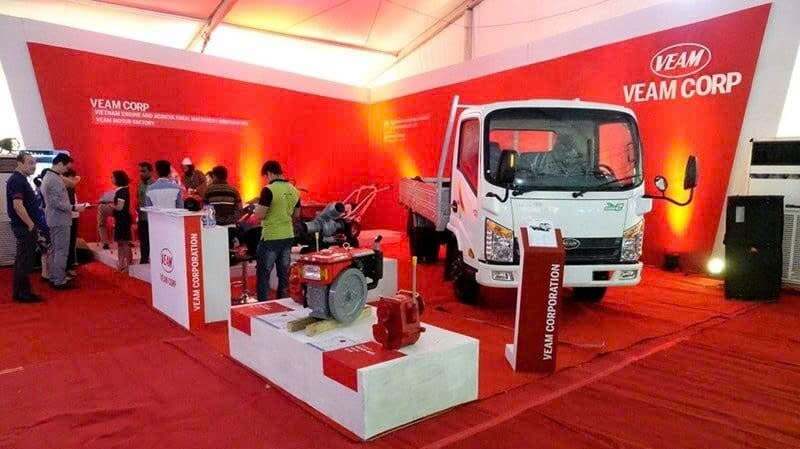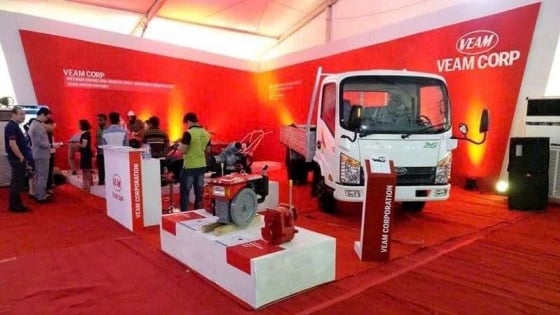By
Ngoc Diem, Minh Hue
Mon, September 8, 2025 | 8:30 am GMT+7
While Vietnam’s stock market has surged in recent months, sending the benchmark VN-Index from around 1,090 points to nearly 1,700, state-controlled VEAM’s stock VEA has remained flat, trading sideways at around VND39,000 ($1.48) per share over the past year.
The stagnation comes despite the company’s consistent profitability derived from its joint ventures with foreign automakers.
However, long-term concerns related to upcoming gasoline vehicle restrictions in Hanoi and Ho Chi Minh City are casting a shadow over the stock’s outlook.
 VEAM’s products displayed at a fair. Photo courtesy of the company.
VEAM’s products displayed at a fair. Photo courtesy of the company.
Solid profits from joint ventures, weak core business
Vietnam Engine and Agricultural Machinery Corporation (VEAM) operates primarily in mechanical engineering, engine and parts manufacturing, and automotive and agricultural machinery. Its main claim to fame is its ownership stakes in highly profitable joint ventures such as Honda Vietnam, Toyota Motor Vietnam, and Ford Vietnam – often dubbed the company’s “golden eggs.”
These joint ventures generate about VND5-7 trillion ($265.15 million) in annual profit for VEAM, with Honda Vietnam alone contributing VND4.5-6 trillion. By contrast, VEAM’s core operations have shown weak or even negative performance.
In the first half of 2025, VEAM’s core business posted gross profit of only VND291 billion ($11 million), down 4% year-on-year. Meanwhile, profits from the joint ventures rose 7% to VND3.07 trillion ($116.29 million), lifting net profit to VND3.41 trillion ($129.17 million), up nearly 5%.
Thanks to this stable income stream, VEAM has maintained a generous dividend policy, paying 40-50% annually, and accumulated substantial cash reserves.
As of Q2/2025, the company held VND16.26 trillion ($615.9 million) in short-term financial investments, making up 52.7% of total assets. Most of this is deposited at BIDV (VND8.18 trillion) and VietinBank (VND6.29 trillion), generating roughly VND1 trillion ($37.88 million) per year in interest income.
However, in H1/2025, deposit interest fell slightly to VND413 billion ($15.64 million) due to a low interest rate environment.
Long-term threats cloud outlook
Despite strong financials, VEAM’s long-term prospects face growing risks. The Vietnamese motorbike market is approaching a turning point. Following the prime ministerial Directive No. 20 issued in July 2025, both Hanoi and Ho Chi Minh City are accelerating plans to restrict gasoline-powered motorbikes in low-emission zones – potentially beginning mid-2026 – and ban gasoline cars starting January 2028.
According to Saigon Securities (SSI), although a similar proposal was floated back in 2017, infrastructure and public transport limitations prevented implementation. This time, however, the urgency appears greater, as the regulations are tied to national goals on emissions and pollution reduction.
With around 14.5 million motorbikes currently in circulation and approximately 200,000 new units sold annually in the two cities (about 10% of Honda Vietnam’s annual sales), the policy could deal a major blow to VEAM’s joint venture earnings.
Even if the transition is slow, market sentiment is likely to be affected, especially as Chinese manufacturers aggressively expand their electric motorbike offerings at competitive prices.
On top of this, the Ministry of Industry and Trade has proposed nationwide adoption of E10 biofuel from 2026, raising concerns about compatibility with older gasoline vehicles and possibly accelerating the shift to electric vehicles (EVs).
Some silver linings on the horizon
Still, the transition may present opportunities. Honda has already launched two electric models in Vietnam and aims for 30 EV models globally by 2030. With a dominant 80% share of Vietnam’s motorbike market, Honda could retain customer loyalty during the shift.
Toyota’s hybrid car sales are also gaining momentum, up 72% since the beginning of the year, albeit from a small base. These developments could offer new revenue streams for VEAM, but are unlikely to fully offset the risks posed by the gasoline motorbike ban.
SSI noted that while regulatory risk is real, it has not yet materially impacted VEAM’s earnings. The company is expected to maintain high dividend payouts at least through 2027.
Delays in listing, audit issues persist
The VEAM stock has traded on the Unlisted Public Companies Market (UPCoM) since 2018, and an HoSE listing is a long-awaited milestone for shareholders. Although the company has repeatedly announced plans to list on the main exchange, it has yet to do so.
At this year’s AGM, board member Ngo Quang Trung explained that the delay stems from unresolved audit qualifications, mostly related to legacy issues. These include overdue receivables, old inventory, and unreconciled accounting items that require time and compliance to resolve properly.
VEAM’s management reiterated that listing remains a priority. The company is working step-by-step to address audit exceptions, improve governance and internal control systems, and ensure no new audit reservations emerge.
However, the H1/2025 reviewed financial statements still include several audit qualifications. These include concerns over the recoverability of longstanding receivables, adequacy of inventory write-downs, and significant legacy issues such as a VND135 billion ($5.11 million) advance to Mekong Auto, and provisions for slow-moving goods without clear valuation methodology.
The auditors also emphasized issues like unrecognized overdue receivables, unbooked provisions, and unresolved costs from a packaging plant shut down since 2015.
Additionally, there are still receivables from individuals under legal enforcement, and VEAM’s privatization settlement has not yet been approved by authorities.
In H1, VEAM posted VND2.09 trillion ($79.69 million) in revenue, up 8.4% from a year earlier, with product and goods sales accounting for 95% of the total. Pre-tax profit reached VND3.51 trillion ($133.65 million), up over 4%, fulfilling approximately 54% of the full-year target.
As of June 30, VEAM had total assets of VND30.76 trillion ($1.17 billion), an increase of VND3.2 trillion ($122 million) compared to the beginning of the year. Financial debt remained low at VND135 billion ($5.14 million), while equity stood at VND29.56 trillion ($1.13 billion).

